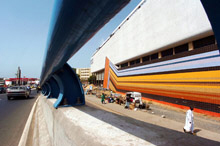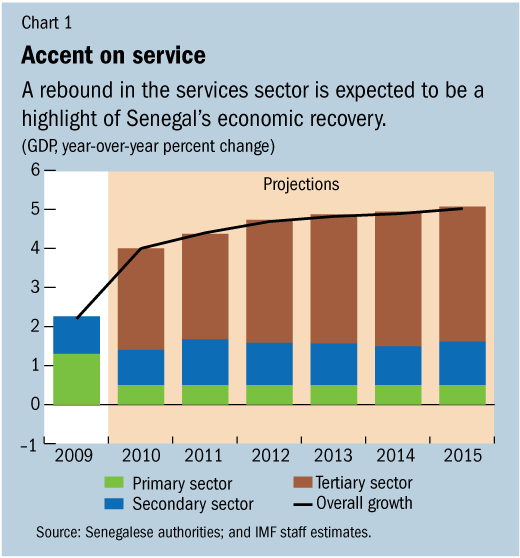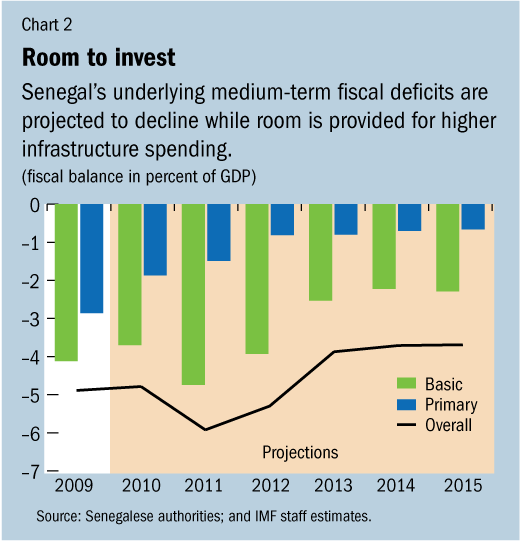
Typical street scene in Santa Ana, El Salvador. (Photo: iStock)
IMF Survey: IMF Renews Support for Senegal's Economic Reforms
December 3, 2010
- Senegal's economic growth began to recover in 2010, set to strengthen in 2011
- New economic program focuses on accelerating growth, reducing poverty
- Authorities plan extra infrastructure investment to address growth constraint
The IMF extended its support for Senegal’s economic and financial policies by approving a new Policy Support Instrument to back the West African country’s economic program.

Highway bridge construction in Dakar, Senegal, where authorities plan to open up infrastructure bottlenecks (photo: Djibril Sy/Panapress)
WEST AFRICA
The policies endorsed by the IMF focus on accelerating economic growth and improving resilience to shocks to help Senegal meet its development objectives.
Maintaining macroeconomic stability and enabling more and better infrastructure investment supported by a sound fiscal policy form the backbone of Senegal’s IMF-supported program. In renewing its support for Senegal’s economic policies, the IMF underscored the need to build on recent achievements and advance structural reforms that can help raise economic growth and reduce poverty.
Senegal’s economic growth began to recover in 2010 and is expected to strengthen further in 2011. Growth is projected at 4 percent for 2010 and 4.4 percent for 2011, after averaging 2.7 percent in 2008 and 2009 (see Chart 1). Consumer price inflation turned positive in June 2010 and has picked up slightly, mainly because of higher food prices. Underlying inflation is expected to remain modest.

However, Senegal’s recovery is still at an early stage and uncertainties about the short-term outlook persist. Risks relate to economic developments in partner countries, the potential for higher oil prices, possible further problems with the domestic electricity supply, and pressures typically associated with pre-election year economic policymaking. To achieve stronger growth, Senegal needs to maintain macroeconomic stability supported by a sound fiscal policy, and also implement broad-based reforms.
Positive conclusion
Approval of continued IMF support for Senegal’s policy program follows the positive conclusion of the country’s previous three-year economic and financial package supported by an IMF Policy Support Instrument approved in November 2007. The previous program helped Senegal improve its public financial management and, together with an 18-month Exogenous Shocks Facility that disbursed $179 million, helped to buffer the impact of a series of external shocks.
The Policy Support Instrument supports low-income countries that do not want—or need—IMF financial assistance but seek to consolidate their economic performance with IMF monitoring and support. The instrument helps countries design effective economic programs that, once approved by the IMF's Executive Board, deliver clear signals to donors, multilateral development banks, and markets of the IMF's endorsement of the strength of a member's policies.
Infrastructure investment
Senegal is planning a sizeable increase in infrastructure investment. Alleviating infrastructure bottlenecks would address an important constraint to growth. To create fiscal space for priority expenditures, including infrastructure investment, Senegal is aiming to generate higher budgetary revenues, improve investment planning, and raise the quality of spending (see Chart 2).

Scope exists to boost revenues by broadening the tax base, reducing tax expenditures, and further increasing the efficiency of tax and customs administrations. To improve investment planning, the authorities are committed to basing investment decisions for large projects on rigorous economic profitability assessments. Further reforms in public financial management are expected to gradually help reduce current expenditure as a share of GDP and improve the quality of spending.
The Policy Support Instrument-supported program includes potential nonconcessional external borrowing of 4–5 percent of GDP over three years to promote public investment, in particular to extend a toll road allowing Dakar to be linked to the new international airport that is under construction, and to two other major cities.
Debt management
Updated World Bank–IMF debt sustainability analysis suggests that extra nonconcessional borrowing would increase the debt burden, but Senegal would remain at low risk of debt distress. However, consideration should be given to various financing options, taking into account carry costs of the financing, implementation risks, risks stemming from exchange rate changes, and the future need for rolling over the financing.
Temporarily higher fiscal deficits resulting from the increased infrastructure investment would need to be reduced to below 4 percent of GDP. With high financing needs and an expansion of nonconcessional borrowing it will be critical to continue to improve treasury and debt management. A national debt office needs to be established soon and a national public debt policy formulated through the preparation of a medium-term borrowing strategy.
Complementary broad-based structural reforms are needed in Senegal to create synergies among reform measures and stimulate the private sector growth that is the key to economic development.
Business climate
The reform agenda continues to focus on strengthening public financial management by improving budget credibility and implementation, and avoiding payment delays to the private sector. Other reforms aim at improving the business climate, raising non-price competitiveness, bolstering governance, and increasing the contributions of the financial sector and the energy sector to growth.
A national financial sector action plan should be implemented to improve the institutional, legal, and operational environment while reducing vulnerabilities. In the energy sector, the acceleration of reforms, in close collaboration with development partners, has the potential to remove a major bottleneck to growth.
Successful implementation of all these complementary reforms should lay a sound basis for higher growth and reducing vulnerabilities, which in turn would be conducive to lowering poverty.


